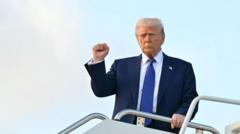John Simpson, the World Affairs Editor, reflects on the potential seismic shifts happening in world politics early in 2025. Historically significant years, like 1968 and 1989, redefined global landscapes — and some believe this year might emulate that trajectory, primarily due to Donald Trump’s controversial leadership.
In stark contrast to his predecessors, Trump’s focus on “America First” has turned the traditional tenets of foreign policy on their heads. By predicating his interactions on personal interests and cost-effectiveness, allies, particularly in Europe, find themselves navigating uncharted waters. Critics have drawn parallels between Trump and the self-promotion of historical figures like Louis XIV, suggesting that his personality uniquely influences policy decisions.
By dismissing Ukraine’s President Zelensky and siding with leaders like Vladimir Putin, Trump’s approach has raised alarms. His insistence on negotiating peace terms favorable to Russia without sufficient leverage extends beyond mere politics; it risks reshaping global power balances. Historically, Russia has been at a disadvantage in negotiations, but current trends suggest a departure from that norm as Trump's tactics emerge.
European diplomats express concern that Trump's cavalier negotiation style lacks the strategic foresight required to ensure enduring peace. Their apprehension hinges on the potential consequences of a compromised Ukraine. With mid-term elections approaching in 2026, the political climate in the U.S. could also shift dramatically, impacting Trump's aggressive policies and strategies.
As the world watches, the evolving situation may test longstanding alliances and introduce new challenges, heralding a transformative era in global diplomacy. If Trump's strategies yield a reshaped geopolitical landscape, 2025 could indeed become a year marked by historical significance.




















